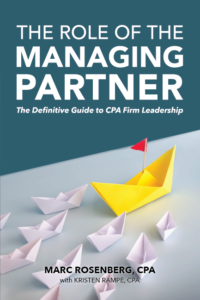Should a Line Partner Perform Firm Administrator/COO Duties?
 QUESTION (from an MP): We are a 7-partner firm. Several years ago when our Firm Administrator retired, one of our partners took on the role in addition to his existing client duties. We are now reconsidering this situation and are wondering if it would be best to have a non-partner in that role. What would you advise?
QUESTION (from an MP): We are a 7-partner firm. Several years ago when our Firm Administrator retired, one of our partners took on the role in addition to his existing client duties. We are now reconsidering this situation and are wondering if it would be best to have a non-partner in that role. What would you advise?
RESPONSE: My comments are customized to firms your size and perhaps up to $30M or so in annual revenue. Many Top 100 firms have one of their partners serve as a COO, but they function at a considerably higher level than smaller firms, performing more as an Executive VP or deputy MP than a COO.
First, it’s important to differentiate between management and administration:
- Management is deciding what the firm should be and making it happen. Building a strong culture. Getting partners to follow. Leadership. Managing partners’ performance and behavior. Holding people accountable. Increasing growth and profits.
- Administration is focusing on the day-to-day. Monitoring and reporting on firm results. Operating, interpreting and upgrading systems, policies, procedures. Supporting client service personnel.
Admin is very important but management is more so. Evidence of this is the fact that MPs generally are paid about 5-10 times what a firm administrator earns.
Client service partners, except the MP, should primarily focus on two things: (1) Providing great service to clients while growing the firm’s revenues and (2) mentoring and training the staff, helping them learn and grow. Partners should not be involved in administration because they should be 100% focused on driving the firm, performing partner-level work, not the work of a $75-$100K a year person. Most partners of firms your size earn between $250,000 and $500,000. Why pay a person at that level to do the job of a $75-100K person?
The Role of the Managing Partner is the only CPA-firm-specific resource for MP success. The book addresses ► how the MP manages partners ► how a good MP impacts profitability ► the MP’s role in managing staff ► how MPs enforce the partner agreement ► essential organizational skills for MPs ► the MP’s job description ► how MPs should be evaluated
Another point: It’s very hard for partners to balance the management of a decent-sized client base with internal duties, whether it’s the MP, COO, etc. The firm always comes in second place. You want someone in the COO/FA job whose #1 client is ALWAYS the firm and is tenacious in carrying that out.
One final point and it’s all about the math. Assume that a firm does not have a firm administrator and instead, delegates a thousand hours of FA duties to several partners. If this firm hires an outside, full-time FA for $125,000, this investment more than pays for itself. How? Because it frees up the partners to spend 1,000 hours of time on partner-level duties. If we use a billing rate of $300, that results in $300,000 (more than covering the FA cost) of benefit to the firm in terms of additional billable hours, business development and staff mentoring by the partners. A “no-brainer” as we like to say!
The MP of a $20M firm recently told me this about their COO: “Our COO acts in many ways as our MP. Our COO is critical to our success. He is an independent voice, almost like counsel. The COO is more objective and has a viewpoint “from the outside looking in” as opposed to the opposite. If you are looking to grow, this position is vital to the firm’s success.”
To be fair, there are scenarios where it may be appropriate to appoint a client service partner as the COO or firm administrator. Here are two of them:
- The firm has a long-time partner whose client base is quite small and unlikely to grow. This person needs work to keep him/her fully occupied. The firm wishes to find a spot in the firm for the person, so the individual is appointed COO or firm administrator. The firm makes a decision that they want to retain this person, even if it ends up overpaying for it.
- For various reasons, the partners of a firm aren’t willing to trust the administration to an outside person who may or may not work out. They may have had a bad experience doing this in the past. So, an executive decision is made to assign FA duties to one or more client service partners and the partners are fine paying a partner-level salary for the FA position.

The Role of the Managing Partner: The Definitive Guide to CPA Firm Leadership
The biggest factor in achieving organizational success is strong management and leadership. In CPA firms, this is the role of the Managing Partner. Want to know how the best MPs across the country are impacting their firms and how you can be a difference-maker and a better MP? Look no further than Marc Rosenberg’s latest…
Learn More